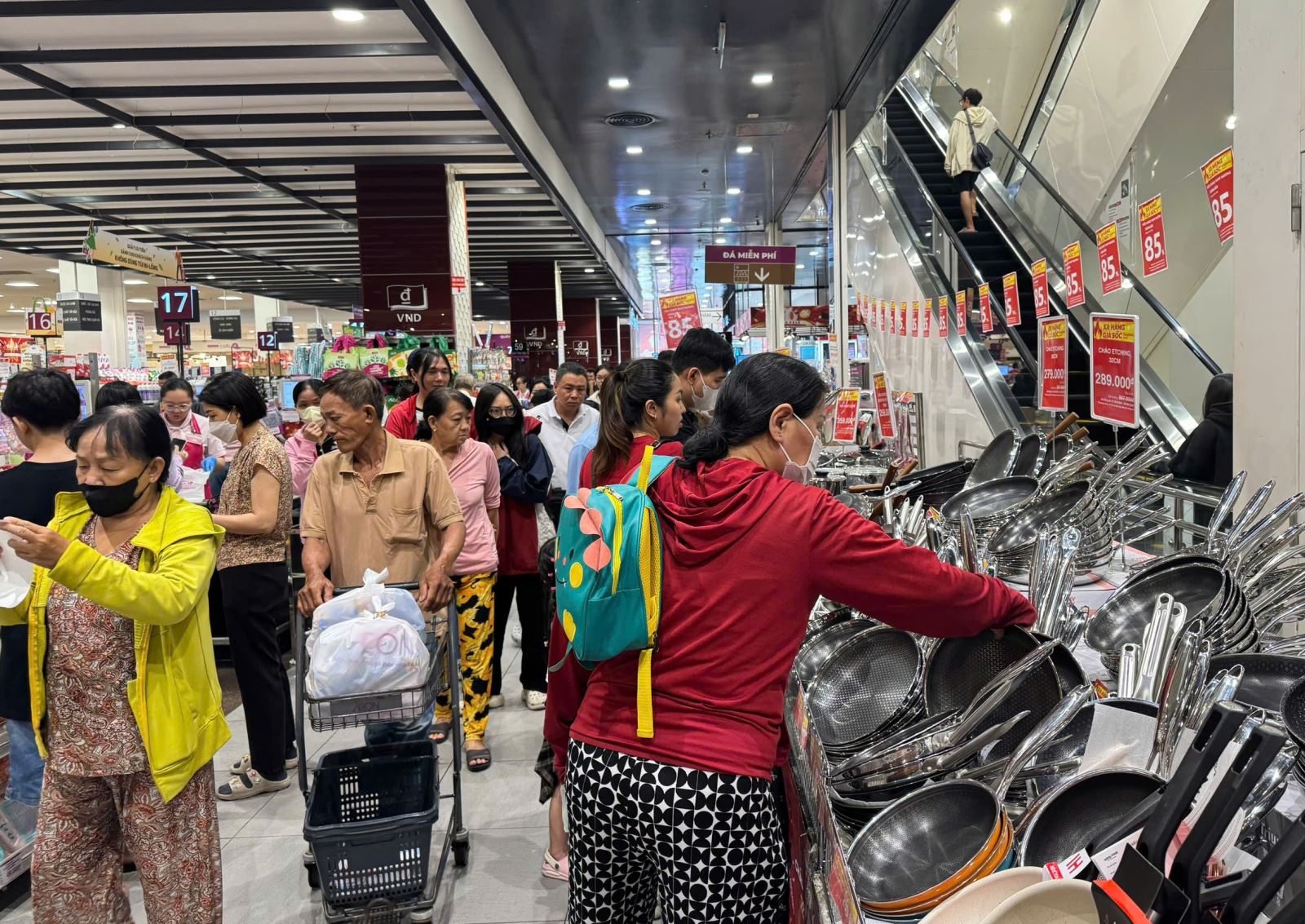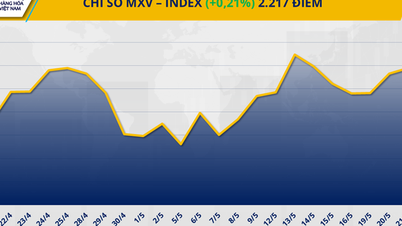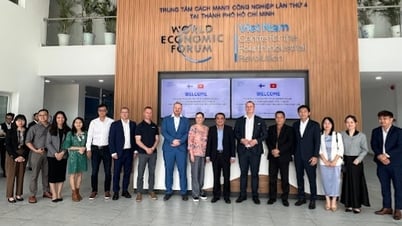
Increase capacity to combat risks
At the CEO Forum 2025 with the theme “Solutions to expand market share for businesses in the context of trade war” held on the morning of May 21, experts and business leaders all agreed that although Vietnam’s exports are recovering positively, there are still many potential risks. Therefore, businesses themselves must still improve their resilience in both international and domestic markets.
Mr. Nguyen Ngoc Hoa, Chairman of the Ho Chi Minh City Business Association (HUBA), said that export turnover in the first 4 months of 2025 reached more than 102 billion USD, an increase of more than 10% over the same period. However, he warned of fragmentation in orders and a downward trend since July. Thin orders and a tightening market have caused many businesses, especially small and medium-sized enterprises, to run out of cash flow.
Sharing the same view, Mr. Pham Binh An, Deputy Director of the Ho Chi Minh City Institute for Development Studies, said that the GDP growth rate in the first quarter of 2025 reached 6.93%, the highest in the period 2020 - 2025, but exports still have potential risks. Vietnam has a trade surplus with the US but a trade deficit with China, reflecting the imbalance and dependence on the foreign direct investment (FDI) sector. Therefore, domestic enterprises need to increase their internal strength to cope with risks such as reciprocal taxes, technical barriers and competition from emerging countries.

According to Dr. Can Van Luc, member of the National Financial and Monetary Policy Advisory Council, in order to export sustainably, Vietnamese enterprises must be ready for scenarios from the trade war. The baseline scenario could be a 20-25% tax on goods entering the US market, which will directly impact competitiveness. Accordingly, enterprises must proactively find solutions and cannot simply rely on support policies.
Ms. Ly Kim Chi, Chairwoman of the Ho Chi Minh City Food and Foodstuff Association, said that businesses in the industry are facing major challenges from tariff and protection policies of many countries. The food and food industry is not only an economic sector but also carries social responsibility, acting as a soft shield to protect production, employment and agricultural value chains. Therefore, to overcome this pressure, businesses need to reposition their export markets, because tariffs are having a strong impact.
Currently, many small and medium-sized enterprises only focus on one market like the US, considering it enough, without a strategy to diversify the market. However, they need to get rid of the mindset of depending on 1-2 markets, because when the US imposes new tax rates, businesses will face great difficulties.
Therefore, Ms. Ly Kim Chi emphasized: “Enterprises need to build competitive advantages in both export and domestic markets. Each product, whether a bottle of fish sauce or a bag of rice, contains its own story. Enterprises also need to focus on green solutions and digital transformation, apply energy saving and traceability. When participating in the ecosystem, small businesses receiving large orders must connect with other businesses to create a sustainable development community.”
Restructuring the market, promoting digital transformation
In the context of export barriers to large markets, experts and businesses believe that restructuring export markets and developing the domestic market is a mandatory trend.
Mr. Pham Binh An said that first, businesses need to segment markets to choose appropriate strategies. Highly protected markets such as the US and EU require high transparency, environment, and technical standards; potential markets such as India, the Middle East, and Africa can be suitable for the current production capacity of Vietnamese businesses; and niche markets, although small, have high added value.
From a business perspective, a representative of Minh Long Embroidery Company Limited in Ho Chi Minh City said: “We used to depend entirely on the European market, but since last year we have opened additional distribution channels to the UAE and Saudi Arabia. The orders are not many but the profits are good, helping us maintain production while the traditional market stagnates.”
Similarly, Mr. Nguyen Quoc Huy, General Director of Vietnam Clean Food Joint Stock Company, said that currently, some businesses are focusing on exporting and neglecting the domestic market, which is a mistake. Domestic consumers are increasingly demanding higher quality and safety, which is an opportunity for domestic businesses to develop sustainably.

From the perspective of technology and digital platforms, Mr. Tran Van Chin, Chairman of the AROBID B2B E-commerce Exchange, said that the traditional business model used to be effective, but in the new context, businesses need to transform. Digital transformation and green economy are currently major concerns from the central to local levels. To help businesses expand their market share, the unit has deployed a digital exhibition model on the B2B platform, where booths can close orders directly.
According to Mr. Tran Van Chin, when the business community participates in the B2B platform, it will not only expand the domestic market but also reach out to foreign markets. In the immediate future, the Vietnam - Singapore platform will be operated by AROBID to connect Vietnamese goods with Singaporean importers. In addition, 95% of Vietnamese enterprises are currently small and medium enterprises. For business households that convert to enterprises, we will support account opening and free of charge for life. These are very practical incentives for the business community.
According to a report from the General Statistics Office and the Private Economic Development Research Board, only 37.4% of businesses have actually embarked on digital transformation and production model innovation. The rest are largely uninterested, unwilling, or do not know what to do.
“The market is changing rapidly, if businesses do not improve their competitiveness, it will be difficult to stand firm even domestically, let alone export. In addition, businesses also need a flexible policy ecosystem, from credit, interest rates, administrative procedure reform to logistics infrastructure and trade promotion. Policies need to aim at maintaining production, supporting cash flow, creating orders, not just tax incentives,” Mr. Can Van Luc added.
Mr. Nguyen Ngoc Diep, Director of An Hung Wood Export Company said: "We are facing many barriers when exporting to the US due to the imposition of defense tariffs. If we are supported with market information, human resource training and access to preferential credit, then businesses will be able to cope."
From a management perspective, Mr. Bui Ta Hoang Vu, Director of the Department of Industry and Trade of Ho Chi Minh City, said that Vietnam has too many FTAs but businesses do not have enough capacity to exploit them. Change is needed, otherwise they will be eliminated even at home. Currently, Ho Chi Minh City is also expanding its regional development space with Binh Duong and Ba Ria - Vung Tau. This promises to open up a new supply chain for supporting and consumer industries.
In addition, when businesses proactively increase their resilience, it not only comes from their internal strength but also from the resonance of policies and practical actions from supporting platforms. In a volatile context, only businesses that proactively transform and take advantage of opportunities from technology, FTAs and the domestic market can stand firm and make a breakthrough.
CEO Forum 2025 “Solutions to expand market share for businesses in the context of trade war”, jointly organized by Saigon Giai Phong Newspaper, Ho Chi Minh City Institute for Development Studies (HIDS), and Ho Chi Minh City Business Association (HUBA) on May 21.
Source: https://doanhnghiepvn.vn/doanh-nhan/doanh-nghiep-can-nang-cao-nang-luc-canh-tranh-de-phat-trien-ben-vung/20250522080627994


![[Photo] Determining the pairs in the team semi-finals of the National Table Tennis Championship of Nhan Dan Newspaper](https://vphoto.vietnam.vn/thumb/1200x675/vietnam/resource/IMAGE/2025/5/21/eacbf7ae6a59497e9ae5da8e63d227bf)
![[Photo] Prime Minister Pham Minh Chinh attends the groundbreaking ceremony of Trump International Hung Yen Project](https://vphoto.vietnam.vn/thumb/1200x675/vietnam/resource/IMAGE/2025/5/21/ca84b87a74da4cddb2992a86966284cf)
![[Photo] General Secretary To Lam works with the Central Inspection Commission](https://vphoto.vietnam.vn/thumb/1200x675/vietnam/resource/IMAGE/2025/5/22/54820e91fd124c4cb691961718c4ee5d)























![[Photo] Prime Minister Pham Minh Chinh chairs the Government's special meeting on law-making in May](https://vphoto.vietnam.vn/thumb/1200x675/vietnam/resource/IMAGE/2025/5/22/1c880aae96fd4e0894abc47a46fe19ba)





































































Comment (0)